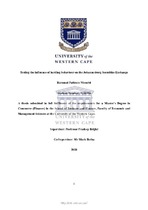Testing the influence of herding behaviour on the Johannesburg Securities Exchange
Abstract
Since the discovery of herding behaviour in financial markets in the 1990s, it has become an area of interest for many investors, practitioners and scholars. Herding behaviour occurs when investors and market participants trade in the same direction during the same time period, as a result of the influence of other investors. Studies on herding behaviour have been undertaken in both the developed and developing economies and majority of these studies have confirmed the existence of herding behaviour in the stock markets. Despite its tremendous growth, the South African financial markets are not immune to such market anomaly.
Herding behaviour on the JSE was first investigated in 2002 focusing in the unit trust industry on the South African stock market. Motivated by this, this study assessed the presence of herding behaviour using the Johannesburg Securities Exchange tradable sector indices. Four indices were employed, namely Financials, Industrials and Resources and were benchmarked against the JSE All Share Index for the period from January 2007 to December 2017. The industrials index ((FINI15) constitutes of 25 largest industrial stocks by market capitalization, the financials index (FINI15) comprises of 15 largest financial stocks by market capitalization, the resources index (RESI10) which represents 10 largest resources stocks by market capitalization and lastly the FTSE/JSE All Share Index defined as a market capitalization-weighted index which is made up of 150 JSE listed companies and is the largest index in terms of size and overall value JSE. The FTSE/JSE All Share Index was used as a benchmark for investors to check how volatile an investment is.
The South African economy experienced the effects of the 2008 global financial crisis from 01 July 2007 to 31 August 2009. This study split the examination period into three categories namely before the global financial crises which was the period starting from 1 January 2007 to 30 June 2007, then the period during the global financial crisis which was from 1 July 2007 to 31 August 2009 and lastly the period after the global financial crises which was from 1 September 2009 to 31 December 2017. Apart from the diversity of the indices, the length of the examination period also had a significant influence towards the magnitude of herding behaviour on the JSE.

